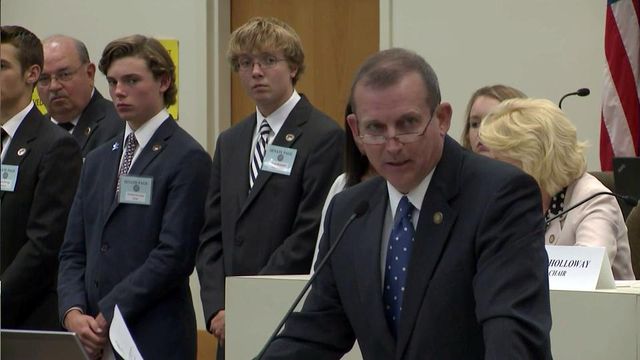House, Senate move closer to budget deal
Lawmakers were a lot more cordial with one another and closer to a budget deal Tuesday afternoon after the Senate offered several key compromises during a meeting of budget conferees.
Posted — Updated"Having these meetings in the public just shows you what happens behind closed doors," said Sen. Harry Brown, R-Onslow, referring to the enmity that's been on display over the past two weeks, with both sides apparently dug in on key issues from teacher pay raises to Medicaid spending.
Last week's negotiations featured sharp words, canceled meetings, a walkout by Senate negotiators and a gubernatorial veto threat. By comparison, the language used during Tuesday's meeting was much more conciliatory.
"The Senate is willing to take the lead to come to a compromise," Brown said.
North Carolina's fiscal year began July 1, but the state is continuing to operate because the General Assembly put a two-year spending plan in place last year. However, lawmakers came into the 2014 summer session pledging to raise teacher salaries and tackle a few other key spending items.
Among the most contentious differences has been the Senate's insistence on a plan that would raise teacher salaries by 11 percent, a move that would put North Carolina in the middle of the pack nationally in terms of teacher salaries. That move would come at the cost of cutting all teaching assistants in second and third grades, as well as drastic cuts to Medicaid eligibility.
In their latest offer, senators put forward a plan to raise teacher pay 8 percent, more than the 5 percent House lawmakers had originally called for, and tempered cuts to teaching assistants. Third-grade teaching assistants would still be cut, but second-grade assistants would keep their state funding for another year. However, funding for those second-grade assistants would be "non-recurring," meaning those positions would expire on July 1, 2015, if no other actions are taken.
"I think that is a key, key concession on our part," Brown said.
Along with an earlier offer to drop the push to end teacher tenure early, Brown described the pay offer as "a major give."
Senators also offered to rewrite the teacher salary schedule much as Gov. Pat McCrory had described earlier this year, simplifying a 39-step schedule down to a plan that front-loads pay rises for teachers earlier in their careers. McCrory had threatened to veto earlier versions of the Senate budget plan that called for an 11 percent teacher raise.
On Medicaid, Brown said that the new Senate proposal would put the Senate and House roughly $30 million apart. However, that funding still represents a potential cut to "aged, blind and disabled" patients who would not otherwise qualify for Medicaid assistance but are unlikely to be able to pay for private health insurance.
"We do appreciate the progress being made," said Rep. Nelson Dollar, R-Wake, the lead budget negotiator for the House.
House leaders did not seem completely happy with the Senate offer. Speaker Thom Tillis asked if senators might consider giving local school districts flexibility to choose between a full 8 percent teacher pay raise or giving teachers part of that raise and diverting other money for teaching assistants and the like.
Part of the problem with cutting funding for teaching assistants is that schools often convert that money to other uses. For example, $64.3 million of the money is used to pay for fully licensed classroom teachers.
McCrory, who has publicly backed the House version of the budget, said in a statement that the flexibility idea was raised during a lunch at the Executive Mansion with Tillis and Senate President Pro Tem Phil Berger. The governor said he is encouraged that Sen. Jerry Tillman, R-Randolph, chairman of the Senate Education Committee, was open to the idea.
"We continue to have objections concerning the elimination of thousands of teacher assistants as well as cuts to core state services, including programs for the elderly, disabled and Alzheimer's patients," McCrory said.
House leaders are expected to counter with another budget offer later this week.
Related Topics
• Credits
Copyright 2024 by Capitol Broadcasting Company. All rights reserved. This material may not be published, broadcast, rewritten or redistributed.






